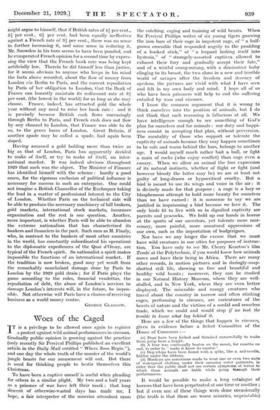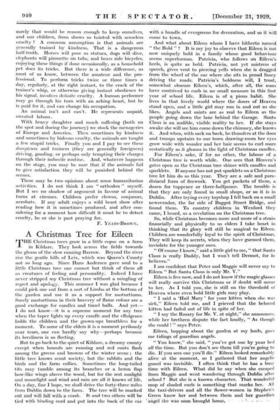Woes of the Caged T T is a privilege to be
allowed once again to register a protest against wild animal performances in circuses. Gradually public opinion is growing against the practice (only recently Sir Percival Phillips published an excellent article in the Daily Mail entitled " Where Zoos Begin "), and one day the whole truth of the murder of the world's jungle beasts for our amusement will out. But there is need for thinking people to bestir themselves this Christmas.
To have been a captive oneself is useful when pleading for others in a similar plight. My two and a half years as a prisoner of war, have left their mark : that long descent of otherwise-wasted days has made me, I hope, a fair interpreter of the miseries attendant upon the catching, caging and training of wild beasts. When Sir Percival Phillips writes of six young tigers gnawing the iron bars of their cage in impotent rage, of " a half- grown crocodile that responded angrily to the prodding of a hooked stick," of " a• leopard lashing itself into hysteria," of " strangely-assorted captives allowed to exhaust their fury and gradually accept their fate," and of a wistful orang-outang, with a diminutive baby clinging to its breast, the two alone in a new and terrible world of savages after the freedom and decency of apedom, the pictures are vivid with what I have seen and felt in my own body and mind. I hope all of us who have been prisoners will help to end the suffering entailed by zoos and circuses.
I know the common argument that it is wrong to think ourselves into the position of animals, but I do not think that such reasoning is fallacious at all. We have intelligence enough to see something of God's plan for ourselves and for animals : our duty and happi- ness consist in accepting that plan, without perversion. The mentality of those who support or tolerate the captivity of animals because they may happen sometimes to be safe and warm behind the bars, belongs to another age. I would myself much rather bait a bull, or fight a main of cocks (who enjoy conflict) than cage even a canary. When we allow an animal the free expression of its natural instincts, whether of flight or fight (and however bloody the latter may be) we are at least not guilty of long-drawn or hypocritical cruelty. But a bird is meant to use its wings and voice in the air : it is divinely made for that purpose : a cage is a lazy or blasphemous attempt to hold more beauty for ourselves than we have earned : it is nonsense to say we are justified in imprisoning a bird because we love it. The only birds fit to live with us in dignified captivity are parrots and peacocks. We hold up our hands in horror at the sports of our ancestors, yet tolerate more mer- cenary, more painful, more unnatural oppressions of our own, such as the importation of budgerigars.
Nor have we any longer the excuse that we must have wild creatures in our cities for purposes of instruc- tion. You have only to see Mr. Cherry Kearton's film Tembi at the Polytechnic, if you would know how animals move and have their being in Africa. There are many other records, in motion pictures and in daringly-snap- shotted still life, showing us free and beautiful and healthy wild beasts ; moreover, they can be studied in our Natural History Museum, where they are well- stuffed, and in New York, where they are even better displayed. The miserable and mangy creatures who travel about the country in narrow and often stinking cages, performing in circuses, are caricatures of the beasts of nature and the victims of a sordid and senseless trade, which we could and would stop if we took the trouble to know what lay behind it.
Here are a few of the things that happen in circuses, given in evidence before a Select Committee of the House of Commons :-
(a) Dogs have been kicked and thrashed unmercifully to make them jump from a height. (b) A bear was continually beaten on the snout, for months on end, in order to " make it know its master." (c) Dog-whips have been found with a spike, like a sail-needle, hidden under the ribbons.
(d) Monkeys are sometimes made to wear one or even two suits of waterproof clothing under their amusing outer garments, in order that the public shall not see certain symptoms of terror to which these animals are liable while going through their performances.
It would be possible to make a long catalogue of horrors that have been perpetrated at one time or another ; but if even one of these things were done occasionally (the truth is that there are worse miseries, unprintable) surely that would be reason .enough to keep ourselves, and our children, from shows so tainted with senseless cruelty ? A common assumption is that animals are generally trained by kindness. That is a dangerous half-truth. Horses will pose as statues, dogs will dive, elephants will pirouette On tubs; and bears ride bicycles, enjoying these things if done occasionally, as a household pet does its tricks. But there is a wide difference, as most of us know, between the, amateur and the pro- fessional. To perform tricks twice or three times a day, regularly, at the right instant, to the crack of the trainer's whip, or otherwise giving instant obedience to his signal, involves definite cruelty. A human performer may go through his turn with an aching heart, but he is paid for it, and can change his occupation.
An animal isn't and can't. He represents unpaid, sweated labour.
With heavy slaughter and much suffering (both on the spot and during the journey) we stock the menageries of Europe and America. Then sometimes by kindness and sometimes by hideous cruelty, the animals are taught a few stupid tricks. Finally you and I pay to see these donzpteurs and trainers (they are generally foreigners) driving, goading, or perhaps only tempting their charges through their imbecile routine. And, whatever happens on the stage, you may be sure that if the animals fail to give satisfaction they will be punished behind the scenes.
There may be two opinions about some humanitarian activities. I do not think I am " orthodox " myself. But I see no shadow of argument in favour of animal turns at circuses. Children prefer clowns, conjurors, acrobats. If any adult enjoys a wild beast show after reading how it is sometimes produced, and after con- sidering for a moment how difficult it must be to detect cruelty, he or she is past praying for.
F. YEATS-BROWN.



































 Previous page
Previous page